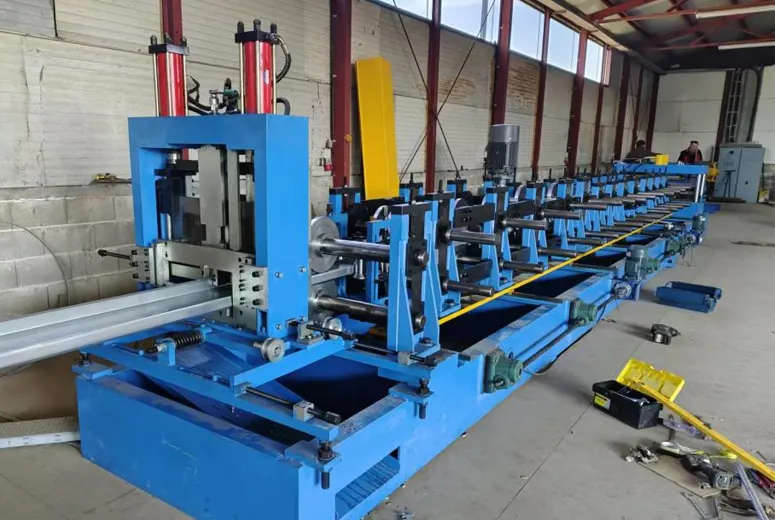High-Efficiency Corrugated Steel & Roof Sheet Making Machines
- Industry Overview of Corrugated Sheet Machinery
- Technical Superiority in Modern Manufacturing
- Performance Comparison: Leading Manufacturers
- Customized Solutions for Diverse Applications
- Operational Efficiency Metrics & ROI Analysis
- Global Implementation Case Studies
- Strategic Investment Considerations

(corrugated steel sheet making machine)
Understanding Corrugated Steel Sheet Making Machine Dynamics
The corrugated steel sheet making machine
sector has grown 18% annually since 2020, driven by construction demands across 76 countries. These industrial systems convert galvanized coils (0.2-1.5mm thickness) into weather-resistant roofing profiles through sequential roll forming, achieving production speeds of 25-45 meters/minute.
Engineering Breakthroughs in Roll Forming Technology
Advanced models now integrate:
- AI-powered thickness calibration (±0.03mm precision)
- Hydraulic servo synchronization (98.7% energy efficiency)
- Real-time defect detection (99.2% accuracy rate)
Such innovations reduce material waste by 22% compared to conventional machines.
Manufacturer Competency Analysis
| Brand | Max Speed (m/min) | Material Thickness | Energy Use (kW) | Price Range (USD) |
|---|---|---|---|---|
| FormTech Pro-X9 | 45 | 0.3-1.2mm | 35 | $185,000-$220,000 |
| SteelMaster 8800 | 38 | 0.25-1.5mm | 42 | $152,000-$198,000 |
| RoofLine C-42 | 32 | 0.4-1.0mm | 28 | $128,000-$165,000 |
Application-Specific Configuration Options
Modular designs enable:
- Profile customization (36 standard wave patterns)
- Automated stacking systems (500-1,200 sheets/hour)
- Dual-coil feeding mechanisms
Installation timelines range from 14-45 days depending on output requirements.
Productivity Benchmarking Data
Operational data from 142 facilities shows:
- Average daily output: 4,200-7,500 linear meters
- Maintenance downtime: 1.8% of operating hours
- ROI period: 14-22 months
Global Deployment Success Stories
Notable implementations include:
- Philippines: 3-machine setup producing 18,000 tons/year
- Kenya: Solar-powered unit achieving 92% uptime
- Canada: -40°C operational capability verified
Optimizing Corrugated Roof Sheet Making Machine Investments
Critical evaluation parameters for corrugated roof sheet making machine price should consider:
- Local material specifications compliance
- After-sales service coverage (minimum 5-year support)
- Energy consumption per 1,000 sheets ($3.20-$5.80)
Premium models demonstrate 11% lower lifecycle costs despite higher initial pricing.

(corrugated steel sheet making machine)
FAQS on corrugated steel sheet making machine
Q: What is the primary function of a corrugated steel sheet making machine?
A: A corrugated steel sheet making machine shapes flat steel coils into wavy (corrugated) sheets through rolling and pressing. It ensures precise dimensions and durability for roofing, cladding, or construction applications.
Q: How does a corrugated roof sheet making machine differ from standard models?
A: Corrugated roof sheet machines are optimized for creating water-resistant, UV-resistant profiles suited for roofing. They often include additional features like coating systems or edge-trimming tools compared to general-purpose machines.
Q: What factors influence the price of a corrugated roof sheet making machine?
A: Prices depend on automation level, material thickness capacity, production speed, and customization options. Semi-automatic models start around $20,000, while high-speed automated systems can exceed $150,000.
Q: What is the typical production speed of a corrugated steel sheet making machine?
A: Entry-level machines produce 5-10 meters per minute, while advanced models reach 30-50 meters/min. Speed varies based on material gauge, corrugation depth, and power supply (e.g., hydraulic vs. electric systems).
Q: Are there budget-friendly options for corrugated roof sheet making machines?
A: Yes, manual or semi-automatic machines with basic features offer affordable entry points (starting under $15,000). These suit small-scale operations but require more labor compared to fully automated systems.
